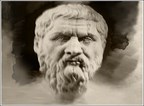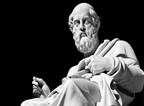The prehistoric Greek philosophers have played a vital part in the forming of the western theoretical tradition. The prehistoric Greek philosophical custom broke away from a legendary approach to describing the globe, and it begun an approach footed on evidence and reason. Initially, related with describing the whole universe, the Pre-Socratic philosophers attempted to recognize its individual underlying rule. Their premises were different and none accomplished an agreement, yet their inheritance was the beginning of the mission to recognize underlying rules. This sparked a sequence of investigation into the border and role of cause. Here, you can find out the Greek development of beliefs as adore of knowledge and the born of ethics, epistemology and metaphysics. Aristotle, Plato and Socrates were the most famous ancient Greek Philosophers as they concentrated their notice more on the responsibility of human-being instead clarification of the material globe. The work of such important philosophers was thrived by the Epicureans and Stoics who’re too concerned with realistic aspects of beliefs as well as the achievement of happiness. In this article you are going to find some valuable information about the most famous ancient Greek Philosophers.
Socrates:
Well, Socrates was 1 of the most renowned philosophers and he was taken birth at Athens in 469 BC. He was just a young teenager at the instant Darius I’s soldiers battle the Greeks in Marathon. Father of Socrates was a stone carver, thus he learned stone carving business. Mother of Socrates was a midwife. Through the Peloponnesian War, Socrates turns out to be an Athenian soldier. While Socrates was forty he start to think regarding the globe. He utilized queries to educate others. He inquired questions like what beauty is or what wisdom is. He had squads of people attempt to reply the queries. They talk about the replies. Socrates carries on to inquire more difficult queries. Some people also get annoyed on this. Plato is one of the most faithful students of Socrates. In 399 BC while Socrates was seventy years old he was blamed in the court of not admiring the gods as well as misguiding the adolescence. He was jailed and verdict to death. 30 days later he passes away by drinking a deadly poison.
Plato:
Plato was taken birth in 427 BC in Athens to a very aristocratic and wealthy family. He turns a learner of Socrates while he was young. Most importantly, Plato educated so many things from Socrates and he was extremely sad by Socrates death. When Socrates died Plato was thirty years old. After Socrates’s decease, Plato started write-down the discussions that he as well as Socrates had. Then Plato starts to write his own thoughts regarding philosophy. 1 of his thoughts was regarding how Athens can create a Republic. He thought there must be some leaders to take the verdicts regarding the populace. These ideas did not attain much attention within Athens. Plato attempted to broaden his thought in Sicily, however the prince did not listen either. Then Plato let go the thought and come back to Athens and there he created a school to educate his beliefs. The School was extremely flourishing. Plato passes away at the age of eighty two and his learners at the school preserved as well as copied all his scripts.
Aristotle:
Aristotle was taken birth in Macedon in north of the Greece and his father was a physician. While Aristotle was kid then he wishes to learn at Plato’s Academy. Subsequent to Plato passes away, Aristotle leave the school and went back to the Macedon to be the teacher of the adolescent prince who later turn out to be the great Alexander. After Alexander become younger, Aristotle went to the Athens and established an academy known the Lyceum. Well, Aristotle was fascinated in science and he utilized Socrates rational method to figure how the globe worked. He was very fond of biology. Aristotle developed a categorization system of republics, democracies, tyrannies, oligarchies and monarchies which people still use these days. While Alexander passes away in 323 BC, the inhabitants led rebellions against Macedonian regulation in Athens. At this instant Aristotle was blamed of being clandestinely on the area of the Macedonians. Ancient Greek philosophers actually have played very important role in shaping of a western philosophical culture. The article surveys seminal works & ideas of the key figures in Ancient Greek tradition from Presocratics to Neoplatonists. It will highlight the main philosophical concerns & evolution in the thought from 6th century BCE to 6th century CE. Ancient Greek philosophical broke away from the mythological approach for explaining the whole world, and this initiated the approach based on the reason & evidence. At first concerned in explaining entire cosmos, Presocratic philosophers actually strived in identifying the single underlying principle.
The theories were very different & none achieved the consensus, still the legacy was initiation of quest to identify the underlying principles. It sparked the series of the investigations in limit as well as role of reason & of sensory faculties, and how knowledge can be acquired & what knowledge comprises of. So, here we will find Greek creation of the philosophy as “love of wisdom,” as well as birth of the metaphysics, ethics and epistemology. Socrates, Aristotle and Plato were most influential of ancient Greek philosophers as well as focused the attention more on a role of human being than in explanation of this material world. Some other notable successors are the Pyrrho‘s school of the skepticism & Neoplatonists like Plotinus who tried unifying Plato’s thought with the theology. Ancient Philosophers were primarily pagans as well as for such reason philosophical activities weren’t completely welcomed by rising Christianity. Thus, end of the ancient philosophy is generally marked by close of Platonic Academy of the Athens by emperor Justinian at 529 AD. Last director of this Academy was Damascius.


